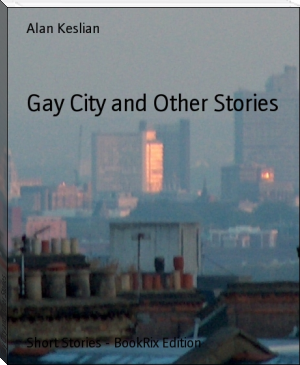Gay City and Other Stories by Alan Keslian (best free e book reader .txt) 📖

- Author: Alan Keslian
Book online «Gay City and Other Stories by Alan Keslian (best free e book reader .txt) 📖». Author Alan Keslian
‘What’s wrong?’ he asked. ‘Aren’t you happy with what we’ve just done?’
‘Oh yes, it’s not that, you were terrific, really good. I mean it.’
‘Good, ‘cos I was wondering how you would feel about meeting me for a drink next time I come to London. I’ve got relatives in Balham. Due to visit them in a couple of weeks.’
‘I’d love to,’ I said, delighted at the prospect of seeing him again and at his having, unknowingly, resolved my dilemma over the month rule. We exchanged telephone numbers. ‘I’ll definitely ring you in a couple of weeks.’
‘And I’ll ring you if you haven’t rung me first. You can count on it. Sorry, but I can’t stay longer with you, much as I’d like to. Got to be back for my evening meal. House rules, I suppose you might say.’
Again I decided to say nothing to Jason. He was sure to press me for more details than I would feel comfortable giving, and would go on to subject me to a lecture about the necessity, as he saw it, of taking advantage of every opportunity and living life to the full, redoubling his exhortations to adopt the promiscuous style of behaviour of which he was so proud. Besides, other events might get in the way of my meeting the diver in London, and telling Jason would give him endless scope to chip away at my hopes and dreams of a lasting relationship. Any mention of the month rule and he would dismiss it, as he always did, as absolute madness.
When he returned from the rocks he was limping slightly. ‘Hurt your foot?’
‘Those damn rocks are as sharp as harpoons. They should put up a warning sign.’
‘Oh dear, let’s have a look. Any luck over there?’
‘A couple of guys hard at it. Full sex. Weren’t interested in me though.’
‘Pity. Your foots not too bad. I’ll go back to the car and get a plaster.’ When I stood up, as well as the trail of disturbed sand leading to the car park, I could see my diver’s footprints and those of his dog, leading up to where I had been snoozing, and stretching back again in the direction from which he had come. Fortunately Jason, intently examining his injured foot, had not noticed them.
‘Well, at least I’ve tried,’ he said when I returned with the plasters, ‘not like you, lying there letting life pass you by. You only get so long on this earth, that’s what I always say. This beach is not so much a cruising ground as a snoozing ground, as far as you’re concerned. When you get old and it’s too late you’ll never forgive yourself for missing out. Ooh aargh.’
The Committee
The Chairman, to call her by the title she herself prefers, rang to warn me she had given my number to someone seeking nomination to The Committee. A few weeks ago, age and decrepitude had taken one of our members from us, so there was an vacant seat. To learn that anyone should actually seek nomination, rather than agree to join reluctantly after much arm-twisting, was a surprise. The Chairman, however, was not encouraging about the hopeful new member. ‘Frankly I’m not sure that he’s suitable. These days there is no reason why someone who is openly gay should not be a member - that’s not what worries me - of course not. Experience and maturity are perhaps the essential qualities we need. My concern is that
he may simply not be the right sort of person. I’d be interested to hear your opinion.’
Mildly irritated, when she mentioned his name I said, ‘I’ve never heard of him. Why are you putting him on to me?’
‘As a general principle, I try to be impartial, leaving Committee members to take the decisions. As Chairman I think it would be wrong to press my own views all the time. We both have a similar understanding of how The Committee ought to work, and you’re discreet.’
‘Glad that you think me a help,’ I said, concealing my annoyance at being lumbered with the potentially awkward task of putting off the would-be nominee, even though discouraging people from taking an interest in The Committee is not usually a difficult task. Describing it as ‘moribund’, i.e. at the point of death, is usually very effective.
Years ago, when our current Chairman was appointed, she wanted to give The Committee a good shake up, to make us apply ourselves again, but her zeal has been slowly eroded, not to say completely exhausted. Something must have become ingrained into the boards of our panelled meeting room, into the wood of our heavy furniture, something that emits a soporific
influence through the ubiquitous dark varnish, an influence that seems to disable all of us. It has slowly seeped into our bones and rendered us hidebound, fossilized and incapable. Eventually it got to her too.
Because of this I thought that putting the prospective nominee off would be doing him a favour. He arrived at my door precisely on time. In appearance he was all new suit and business case. A senior executive in his early forties, he had made his money converting disused city warehouses and commercial buildings into flats, or to use current estate agent jargon, open plan apartments. I started off with a polite question. ‘How did you hear about the vacancy?’
He gave me an attractive smile. ‘I was afraid you might ask me that. A couple of weeks ago I read in the obituary columns about The Committee’s recent unfortunate loss. I made enquiries, and eventually had a short interview with the Chairman. She suggested I speak to you.’
For a few moments I revisited the phone conversation with her in my mind. As though he had read my thoughts he added: ‘I don’t want to be a nuisance to you, but after all you are the longest serving member of The Committee, and having a few words with you before having my name put forward did seem like a good idea.’
Did she have to tell him that I was the longest serving member? He must have concluded that my bottom was stuck to the seat. Were it not for the malaise of inability and indecisiveness that afflicts all members of The Committee, I would have resigned years ago. The trouble is one antediluvian member going will never be enough to eliminate the torpor currently holding us back. The majority, perhaps all of us, would have to be disposed of.
The time had come for me to be firm with him. I resorted to a sly comment that implicitly questioned his motives. ‘Kind of you to come forward and volunteer to make up the numbers.’
‘Oh, I hope to be altogether more enterprising than that. Now that we gay men and lesbians are widely accepted in society, the time has come for us to be represented on national committees such as this. The pace of social and political change has increased so much, there is a great need for a committee that will initiate moves to integrate and adapt our social institutions. I hope to bring a new viewpoint and propose fresh ideas. As an example, there is much to be done on the legal status of same sex couples, and on exploiting our potential for raising children.’
He reminded me of how The Committee used to be when it was first set up. They were days of rapid social change. Old institutions and habits of thinking were swept away, and new social and political structures were developed to help the nation forward into a happier and more prosperous era. The Committee was tireless. All over the country it began new ventures, resolved disputes, engendered new optimism and dynamism. For many our actions created opportunities for success and happiness - though inevitably, for a few, change was not welcome. As success followed success, the power and influence of The Committee grew until it was acknowledged as a major instigator of reform.
That was a long time ago. Now it lives on its past, respected out of tradition, but in truth completely bogged down, ineffectual, ignored by newspapers except for a rare mention when no more exciting story can be found to fill the columns.
The Committee, even now, has a substantial budget. It has an office building and a dozen administrative staff; its members go on official visits across the country, staying in the best hotels. Receptions are held, inspections are organized, and great, but undeserved, deference is shown. The unnecessary cost is part of what riles me, but more important is that we are setting a bad example, giving the wrong lead, encouraging people to respect our empty show of formality and process, when they should be looking for substance and originality. If his aim was to achieve things in the world, my visitor would do better to look elsewhere.
‘Are there not other organisations more in tune with today’s issues which would be more suitable for you than this, let me be frank, rather geriatric Committee?’
'There are pressure groups aiming to strike a blow against prejudice and discrimination. Some of them I respect, but I do not myself have the personality or the confrontational flare they need. I am a businessman, I absorb facts; I understand figures, Know about administration, and how to get the best out of people. For me, given my nature and abilities, becoming a member of your Committee seems an ideal way for me to make a contribution. And, forgive me, please don’t take this in any sense personally, but the age of the present members surely means that fresh faces are needed.’
He won me over, despite the Chairman’s low opinion of him. In order to join The Committee he would need a majority of existing members to sign his nomination form. If he could obtain enough signatures, the subsequent processes were a formality. I told him how to contact the members who were likely to agree. With my support, and if all of them backed him, he would have a bare majority. I promised to help if anyone needed persuasion. I rang the Chairman at once to confess what I had done, expecting her at the very least to be annoyed.
She revealed that, in her earlier call, she had put on an act of being against him. ‘He made a very strong impression on me, but I wanted you to make up your own mind,’ she said. 'That was why I did not to reveal how was keen I was on him. I may be Chairman, but you are the one who is best at winning over the other members. After five years, most of them still consider me far too much of a new girl to take me seriously.’
She was exaggerating her length of service, which was nearer four and a half years than five, but I let that pass. As for pretending earlier to be against the new nominee, in life you often cannot tell whether people mean what they say, or if they are deliberately making misleading statements as a ploy to gain some undeclared advantage. Whether in reality she was now telling the truth, or might for some reason have changed her mind about the new nominee, did not matter.
Soon I had other concerns. One of my suggested nominators, a man fond of calling himself a liberal, turned out to hate gays. This discovery had me scanning the names of the





Comments (0)